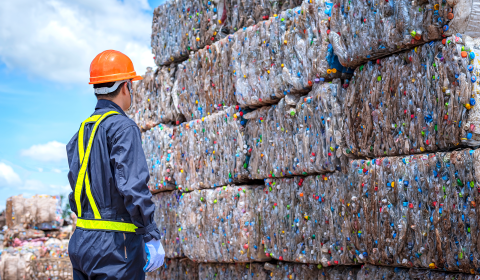
Rethinking recycling for greater impact
Consumers are usually loyal to brands they love. However, demand for sustainable retail is at an all-time high, making them increasingly willing to switch allegiance toward a more environmentally friendly brand. Sustainable packaging is a top priority for 43% of shoppers, though only 14% of all plastic packaging is currently collected for recycling.[1] To help consumers adopt more environmentally conscious lifestyles, retailers should start by ensuring they implement and optimize recycling programs.
The recycling challenge
Many forward-thinking companies are already doing their part to reduce and reuse plastic waste. For example, the reward program Loop requires customers to pay a deposit on its containers, which is refunded when returned for refilling. Unsurprisingly, Loop has a return rate of over 80%. A 2019 report found that glass-bottle recycling rates are 40% higher in US states where a refundable deposit is included in the cost of purchase.[2]
However, uptake for programs like this remains low both among retailers and consumers, since placing responsibility for recycling on the consumer can cause other issues. It’s necessary to have a good understanding of what can be recycled and where; otherwise, waste can still end up in landfill or be incinerated. Many consumers do not even know, for example, that their household textiles can be recycled; a recent BIR Convention estimated recycling rates for household textiles at 26% in Europe, 15% in China and 12% in the US.[3]
While companies cannot be held solely responsible for solving the global waste crisis, they do have significant influence. Through clear, transparent and convenient recycling programs, they can drive action and effect real change. The best way for responsible companies to ensure they are doing everything they can – effectively and efficiently – is to undertake independent third-party retail audits.
The benefits of bespoke retail audits
Bureau Veritas offers customized assessments for the retail sector that range from network conformity to recycling program audits. For recycling, the key to success is building a program that is customer focused. It needs to incentivize consumers to recycle, make it easy for them to do so, reflect local and cultural needs, and generate long-term behavioral change.
A typical retail recycling audit might involve an on-site audit in stores with a dedicated checklist to assess the different elements involved – from collection points to recycling centers. The benefits of bespoke audits are multifold. They offer retailers an effective overview of the recycling process and enable them to monitor local store practices to ensure guidelines are implemented correctly. They help make sure that recycling programs are comprehensive and that customers receive consistent service. Ultimately, the goal is to increase recycling rates and lower environmental footprint.
Where Bureau Veritas adds value
Bureau Veritas audits, including our unique mystery shopper service, help identify a retailer’s weaknesses and ensure consistent branding and service. They make sure clients focus on key business by outsourcing, monitoring shop practices, and checking that guidelines are implemented correctly. The end result is the ability to monitor and reduce environmental impact while reaping the benefits of improved brand image, along with the customer trust and loyalty that inspires.
Brochure: Customized Audit Services
DOWNLOAD
